This article was originally published by The Strategy Bridge.
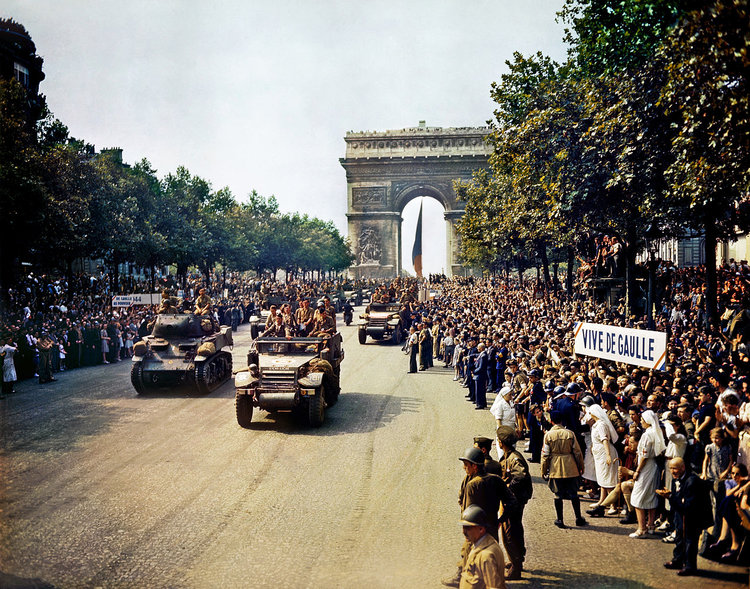
(Jack Downey, U.S. Office of War Information/Wikimedia)
Introduction
When it comes to France in World War II, most studies naturally and understandably focus on its dramatic defeat in 1940. However, the general public seems to forget about a more lasting outcome: how France managed to gain a seat amongst the victors of the war. Indeed, despite having lost its pre-war status as prime international power, suffering a punishing defeat in 1940 leading to German occupation and annexation, and being a secondary actor during the war, France in 1945 secured a place among the winners. General Charles de Gaulle and Free France, through their military and political acuteness, along with their relentless perseverance, managed to accomplish this feat. It was done mostly thanks to the use of the military tools at their disposal—including intelligence—that were directly instrumentalized to obtain concrete political gains.
Every student of military strategy knows that war is the continuation of politics; force is meant to be used in pursuit of one or several more or less specific political goals. Consequently, the way force is used varies based on such goals. Charles de Gaulle and Free France demonstrated these principles well. This article will first detail how they used intelligence, before showing how they used the military in pursuit of political goals. By doing so, this article aims to provide a concrete example illustrating the most famous Clausewitzian principle.
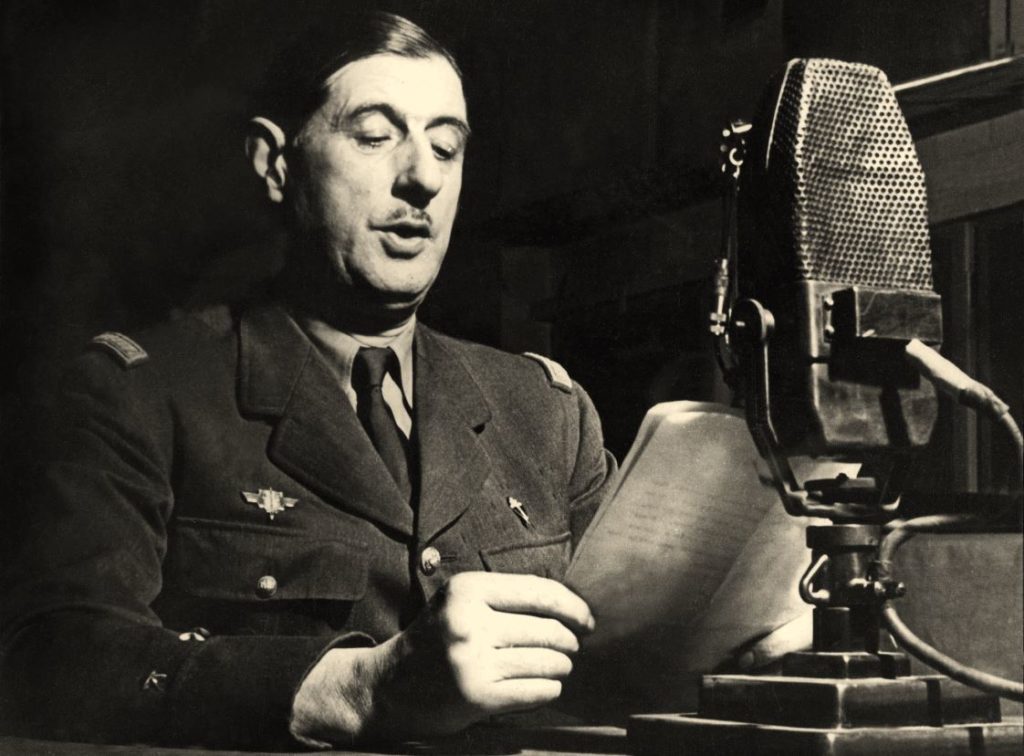
(Wikimedia)
The Bureau central de renseignements et d’action: Collecting Intelligence for Political Influence
After fleeing to London following the debacle of 1940, General de Gaulle created his political entity, Free France. Its goal was to keep on fighting the Axis and to eventually liberate France.
Among its institutions was an intelligence service that bore several names, most famously known as the Bureau central de renseignements et d’action, or the Central Bureau of Intelligence and Action. With limited means in 1940, the founders of this intelligence service initially saw clandestine action as the best way to participate actively in the conflict and to assert the future claim that France was a victor of the war.[1] Its leader, André Dewavrin, also known as Colonel Passy, wanted to put intelligence at the direct service of politics, and wished the Central Bureau of Intelligence and Action would become more than a mere intelligence service providing information. He wanted to trade with the Allies, military intelligence for political influence.[2] Eventually, that is what happened.
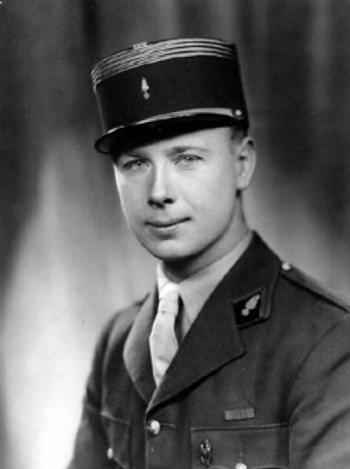
(Musée de l’Ordre de la Libération/PVDE/Bridgeman Images)
The political role of the Central Bureau of Intelligence and Action centered on the French Resistance. The Resistance, in the Free French plans, had to be the catalyst of Gaullism and was used both as a leverage towards the Allies and as a means to exert political influence in France.[3] The intelligence service consequently sought to organize and control the multiple Resistance movements. Organizing and controlling them had several purposes.
First, it would allow Free France to undermine the Vichy regime and to underwrite the legitimacy of Charles de Gaulle.[4] Indeed, the French General wanted to make Vichy appear as nothing more than a pseudo-government and to establish Free France as the provisional central authority safeguarding French interests. It would also be a way to be recognized by the Allies as the depositary of French sovereignty, and by the French people as the public authority.[5]
Second, it would enable Free France to assert its role and credibility among the Allies. Charles de Gaulle wanted to prove that without the participation of the Resistance, which he would ideally control, intelligence gathering and military action in France was effectively impossible. It was essential to show the involvement of the Free French was necessary to the conduct of any kind of Allied operation in France.[6]
Third, the organization and control of the Resistance would be a way for the Central Bureau of Intelligence and Action to prevent a general insurrection in France before the liberation of the country. The Free French intelligence service did not want such an event to happen, as it might lead to the destruction of its assets on the ground, which would leave the Gaullists unable to support the Allied landings. Consequently, it would deprive them of the main means to generate a role among the victors at the end of the war.[7]
Finally, centralized control of the Resistance movements was a way to prevent them from developing significant political ambitions of their own and considering themselves as independent actors.[8] Even by late 1942, much of the Resistance was by no means Gaullist, and some of them preferred to deal directly with the British or the Americans without referring to Free France.[9]
Therefore, during the war, the Central Bureau of Intelligence and Action collected intelligence and used it as leverage to gain political influence in France. Free France eventually managed to unify the Resistance movements under its umbrella and dominate the domestic political landscape during the liberation of the country. The work of the Free French intelligence service helped France earn its seat among the leaders of the post-war world order. Consequently, the Central Bureau of Intelligence and Action was more than a mere intelligence service limiting itself to the collection and exploitation of information. Rather, it was a political tool, in the very Clausewitzian sense, and used intelligence as both a military and a political means to directly participate in the accomplishment of the Gaullist political goals.
The French Army: Occupying Territory for Political Gains
The French Army, which was renewed following its defeat in huge part thanks to the manpower coming from the French possessions in Sub-Saharan and North Africa and enormous American material support, was another tool to obtain political gains. Like the Central Bureau of Intelligence and Action, the French Army would be a means to prove an ability to fight the Axis, liberate the country, and earn a spot among the victors of the war.[10] However, it would prove a delicate task for Charles de Gaulle. During the Allied campaigns of liberation, French forces mostly played a secondary role, in part because of their limited numbers. The French General had to carefully use his assets to prevent France from being a powerless subject of the Allies. He could rely on two elements: the Resistance, which had been unified thanks in part to the work of the Central Bureau of Intelligence and Action, and also regular troops under the command of Generals Philippe Leclerc and Jean de Lattre de Tassigny.[11]
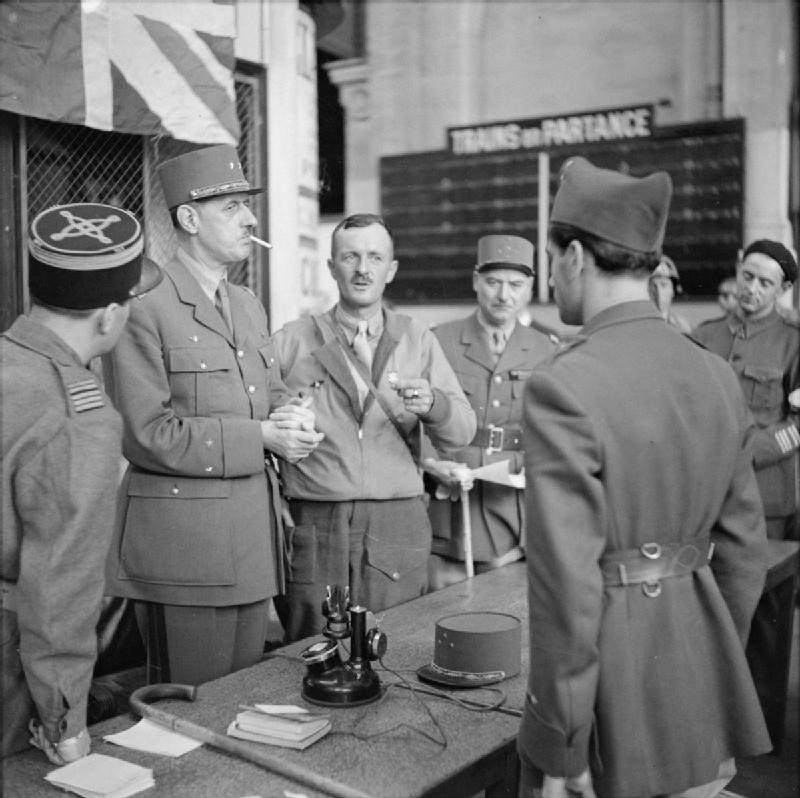
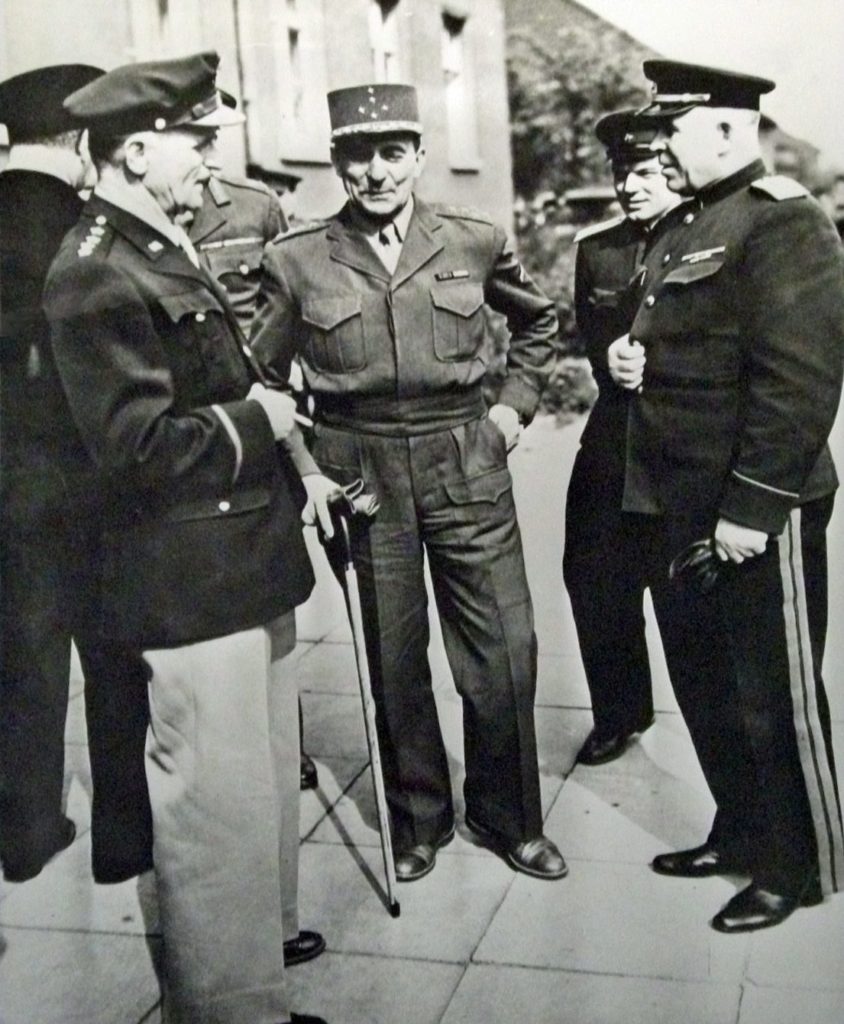
(Wikimedia)
Slightly cropped by blog owner
License
In France and in Germany, the French Army participated in the fight against the Axis, enabling de Gaulle to obtain political gains at both the domestic and coalition levels by liberating and occupying territory. Two events illustrate this.
The city of Strasbourg, which was part of the German-annexed Alsace-Moselle region, was liberated by the French forces on November 23rd, 1944. However, after the start of the Battle of the Bulge in December, General Dwight Eisenhower feared the front would break. Therefore, he ordered the 6th United States Army Group to change its posture in January 1945. As a consequence, Strasbourg would be left undefended, and exposed to a new German occupation.[12] While the city was, from a military perspective, relatively unimportant, it represented a symbolic value to the French: they could not simply abandon a French city that had not only been occupied, but also annexed by the Germans. Charles de Gaulle considered leaving Strasbourg to its fate without fighting would be an “unrepairable national disaster.”[13]
Consequently, de Gaulle ordered General de Lattre to defend Strasbourg no matter what—contradicting American orders as the French First Army was part of the 6th United States Army Group, under the command of General Jacob Devers. Eventually, thanks to talks between Generals de Gaulle and Eisenhower, the Americans agreed to maintain their presence in the city; they would abandon it only in case of absolute necessity, and the French would be in charge of its defense.[14]
Another example of de Gaulle using the military to directly accomplish a political goal occurred later. On March 28th, 1945, the French General ordered his troops to cross the Rhine, against the orders of Dwight Eisenhower who had assigned a defensive mission to the French on the west bank of the river.[15] About 200,000 troops crossed the Rhine three days later.[16] The goal was to reach the German states of Baden and Württemberg, which de Gaulle wanted to be part of a future French occupation zone.[17] Over the month of April, the French occupied the German cities of Karlsruhe, Freiburg, and Stuttgart.[18] General Devers then ordered General de Lattre to leave Stuttgart on April 24th. However, de Gaulle maintained his position and ordered the French First Army to hold the city no matter what. Ignoring General Devers’ order, the French remained defiant and even entered Ulm on the same day, which opened a way to Austria, whose territory was now at risk of falling to French hands.[19] The Danube was then crossed on April 29th, and troops of General Leclerc reached Berchtesgaden on May 4th.[20]
Occupation borders and territories from 1945 to 1949. British (green), French (blue), American (orange) and Soviet (red) occupation zones.
This series of moves was a way to produce a direct and concrete political outcome, the existence of a clearly delimited French occupation zone in Germany after the war. At the time, the Allies had agreed in principle to a French occupation zone, but had not determined its boundaries. Until the request was acceded, the French decided that they would administer all German territory occupied by their forces.[21] Eventually, Eisenhower complied.[22] Despite directly contradicting Allied orders, France gained an occupation zone in Germany, and the French First Army became an occupation force after being disbanded on July 24th, 1945.[23]
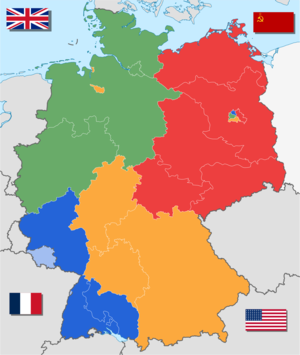
(Wikimedia)
Conclusion
During the war, Free France and Charles de Gaulle directly used intelligence and limited military means to accomplish concrete political goals. These vignettes illustrate that war is the continuation of politics by other means. The Central Bureau of Intelligence and Action and the French Army participated directly in the accomplishment of clearly formulated political goals, to the extent where even tactical military objectives, such as holding or capturing a city, directly served strategic political goals.
France is often mocked for its crushing defeat of 1940. The truth is that no contemporary army was able to defeat the German ground forces at the beginning of the Second World War. Back then, the German doctrine and tactical excellence on land enabled them to outrank the ground forces of all the other states. The United Kingdom had the Channel—which enabled the Royal Air Force and Navy to hold off the Germans—the Soviet Union immense strategic depth, and the United States the Atlantic. Norway did have a body of water that could have helped against the Germans, but failed to avoid invasion and was defeated. France had none of these, just like Czechoslovakia, Poland, Denmark, Belgium, the Netherlands, Luxembourg, Yugoslavia, and Greece.
However, France managed to remain an international power (albeit greatly diminished compared to its pre-war status), gain a permanent seat at the United Nations Security Council, and be considered a victor of the Second World War. It did so despite German occupation and annexation, despite the existence of the collaborationist Vichy regime, and despite the huge but necessary reliance on American and British material support during almost the entire war. Here lies the real victory of France during the Second World War. It was not military. It was political. And when it comes to war, the political aspect is ultimately what matters the most.
[1] Sébastien Albertelli, “Les services secrets de la France Libre : le Bureau Central de Renseignement et d’Action (BCRA), 1940-1944,” Guerres mondiales et conflits contemporains, no. 242 (2011/2), 8.
[2] David De Young De La Marck, “De Gaulle, Colonel Passy and British Intelligence, 1940-1942,” Intelligence and National Security 18, no. 1 (2003), 23.
[3] In this context, “Gaullism” means the ethos, ideals, and objectives of the Free French.
[4] Douglas Porch, The French Secret Services: From the Dreyfus Affair to the Gulf War (New York: Farrar, Straus & Giroux, 1995), 225-26.
[5] Albertelli, “Les services,” 11.
[6] Porch, The French Secret Services, 226.
[7] Albertelli, “Les services,” 10.
[8] Ibid., 16-7.
[9] Porch, The French Secret Services, 187.
[10] Claire Miot, “L’armée, meilleure carte politique du Général,” Guerres & Histoire, no. 24 (April 2015), 50.
[11] Olivier Wieviorka, “Démobilisation, effondrement, renaissance 1918-1945,” in Histoire militaire de la France, II. De 1870 à nos jours, edited by Hervé Drévillon, Olivier Wieviorka (Paris: Editions Perrin, 2018), 450.
[12] Ibid., 470.
[13] Miot, “L’armée,” 52.
[14] Ibid.
[15] Ibid., 53.
[16] Wieviorka, “Démobilisation,” 472.
[17] Miot, “L’armée,” 53.
[18] Wieviorka, “Démobilisation,” 472.
[19] Miot, “L’armée,” 53.
[20] Wieviorka, “Démobilisation,” 472.
[21] Miot, “L’armée,” 53.
[22] Ibid.
[23] Wieviorka, “Démobilisation,” 474.
